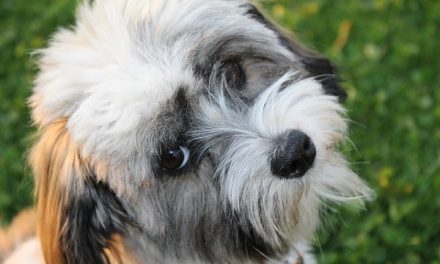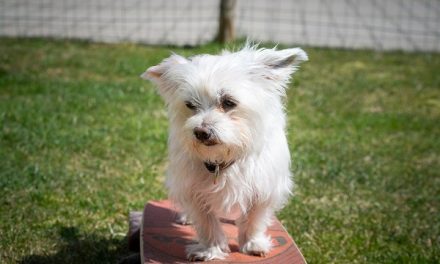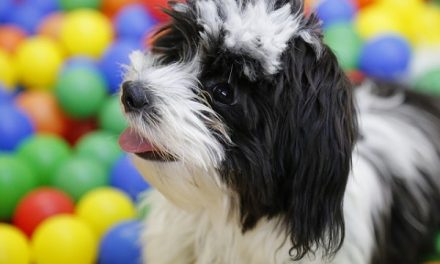With a nickname like Havapoo, you have to know upfront this is one of the cutest hybrid dog breeds on the planet.
Also frequently nicknamed the Poovanese, Havanoodle, and Havadoodle, the names just get cuter and so do the dogs.
But what distinguishes the Havanese Poodle mix from other so-called hybrid dog breeds? For that matter, what is a hybrid dog breed?
Whether you are in search of a family dog who will be good with kids, you want to be sure your new pup is easy to train, you need a hypoallergenic dog breed or you just want to learn more, this is the comprehensive article you need to read!
Havapoo Photos
Courtesy of @winston.havapoo
What Is a Hybrid Dog Breed?
Here, the word “hybrid” is a simple fancy word that means “deliberately mixed breed dog.” You may have also heard the term “designer dog breed” and the two terms are essentially used interchangeably.
While some controversy yet exists around the existence of hybrid or designer dog breeds, what you need to know is that in some sense, every single dog that ever lived is a hybrid.
As you probably guessed from the nicknames, the Havapoo is a cross between the Havanese purebred dog breed and the Poodle purebred dog breed. Just like the Cavapoo is a cross between a Cavalier King Charles Spaniel and a toy or mini poodle.
As we will take a look at in just a minute in this breed’s history, even the Havanese and the Poodle were at one time hybrids.
Nearly every modern dog breed we know and love today was created deliberately by people. The most common way a new dog breed is created is to cross other existing purebred dog breeds together.
The Poovanese is called a hybrid today because this dog breed is still developing. Give breeders a few decades and it is likely there will be a push to register the Havanese Poodle dog as a new purebred dog breed in its own right.
Best Toys and Beds for Havapoo puppies
Choosing the Right Hybrid Companion Dog for You
While there is a lot to love about crossbreeding two different purebred dog breeds to benefit from the desirable strong traits of each, this also presents special challenges when choosing a puppy.
The truth is, literally every single aspect of your new dog, from personality to coat type to size, can vary from puppy to puppy even within a single litter.
This is because it is not possible to predict in advance precisely how each parent dog’s genes will influence each puppy. This is particularly the case in early litters where one parent is a full purebred Havanese and the other parent is a full purebred Poodle.
In later litters when one or both parents are hybrid Poovanese themselves, every single trait among puppies in a single litter, including personality, temperament, size, coat and more, becomes a lot more standardized.
So here, if you really want a Havapoodle with a particular trait or set of traits, such as a hypoallergenic coat with an outgoing personality (towards you and also strangers), you may find it smart to work with a breeder that specializes in true hybrid-to-hybrid dog breeding.
For general information purposes, this is how hybrid dog breeders categorize different levels of hybrid dog breeding:
– F1: two purebred dog parents: a Havanese and a Poodle.
– F1b: one purebred dog parent and one hybrid dog parent (usually the purebred dog parent here is a Poodle).
– F2 and later: two-hybrid dog parents.
This is a somewhat simplistic explanation as breeders select parent dogs at each level with great care to enhance or play down certain traits.
But it is enough to give you a good idea of what level of breeder you may want to seek out when searching for the right Havanoodle for your companion dog.
History of the Havapoo
Now that you have a good working knowledge of what the phrase “hybrid dog breed” means, let’s dig a little deeper and learn more about the history of this still-new evolving breed, the Havapoodle.
The Havanese Poodle mix has one purebred Havanese dog parent and one purebred Poodle dog parent. This means the best way to learn more about Havapoodles is to learn about each parent dog breed!
The Havanese Dog Breed.
The Havanese is a truly unique and ancient purebred dog breed. This dog breed takes its breed name from its country of origin – in Havana, Cuba.
In fact, according to the American Kennel Club (AKC), the Havanese is the only dog breed that is considered to be a Cuban native.
These dogs are incredibly popular not just in their home country but all around the world today. Currently, the Havanese is the 24th most popular purebred dog breed in the United States (out of 195 AKC-registered purebred dog breeds).
If the Havanese dog’s petite, adorable looks seem familiar, it is because this dog hails from the same breed lines that produced the Bichon Frise, Maltese and also – wait for it – most likely the Poodle.
It is quite likely that the modern Havanese dog breed was developed with influence from crossbreeding all three of these purebred dog breeds.
The Havanese has long been accustomed to celebrity, having kept historical company with the likes of Charles Dickens, Ernest Hemingway and, more recently, Barbara Walters and Heidi Klum, among many others.
The Poodle Dog Breed.
Poodles didn’t always come in three sizes (standard, miniature, toy). But they have always been wildly popular. Today, the Poodle is ranked seventh out of the American Kennel Club’s 195 registered purebred dog breeds.
Interestingly, the common nickname “French Poodle” is a complete misnomer. In France, these fine and fancy pooches are called Caniche (“duck dog”).
As a breed, the Poodle’s history spans back more than 400 years. However, the standard is the only Poodle size with an enduring history. The miniature and toy sizes didn’t come along until the 19th and 20th centuries, respectively.
The miniature Poodle is the size that is most commonly cross-bred with Havanese to produce Havapoodle puppies, although sometimes a standard Poodle parent is also chosen.
If you have already been studying the recent uptick in the popularity of hybrid dog breeds (Goldendoodle, Labradoodle, Schnoodle, etc.) you have probably noticed a whole lot of Poodle parents in the mix.
Why is this, you might well ask? As it turns out, the Poodle has a coat widely reported to be hypoallergenic. For people who suffer from an allergy to pet dander, which we will look at more closely here in a moment, a hypoallergenic dog is often the only option.
This is why Poodles of any size have become a very popular addition for breeders seeking to develop their own new hybrid dog breed lines. It is also a big part of the reason for the interest in developing a hybrid between the Havanese and the Poodle.
Havapoo Size and Weight
The size of the Poodle parent causes some variance in the size of Havapoodle puppies.
In general, this hybrid dog breed will weigh between seven and 20 pounds in adulthood and stand between eight and 15 inches tall (paw pad to shoulder).

Havapoo Personality and Temperament
Now we know that both the Havanese and the Poodle are very popular around the world, which bodes well for the personality and temperament of any dog that contains each breed’s genetic history.
But what are the Havanese Poodle dog’s personality and temperament actually like in real life?
Owners report these dogs are generally sunny, happy, friendly and eager to interact with “their” people in particular and with people in general.
Remember our discussion earlier about breeders who work at different levels (F1, F1b, F2, and so forth)? Here is where you will start to see differences emerge based on the inherent stable traits of each parent dog breed.
For example, the Havanese are known to be sunny, friendly and outgoing with both “their” people and with unknown people. This is a breed that has literally been bred to live side by side with people (and often right on top of people nestled comfortably in their laps).
While Havanese does make good watchdogs, the breed’s natural bent is towards friendliness.
Poodles, on the other hand, are traditionally known to be very affectionate, loyal and loving toward “their” people but more reliably aloof or standoffish with strangers.
This not only makes the Poodle an excellent watchdog but can also require some extra training and socialization, especially in the smaller miniature and toy size Poodles which can display some social anxiety when improperly trained or untrained.
Right away you can see how it will be important to work with a breeder who can give you a reliable guesstimate of what your Poovanese puppy’s adult personality and temperament will be like.
Socialization and training can make up for some amount of standoffishness but they will never overtake genetic programming.
Havapoo Energy Level and Exercise Needs
One of the big questions people often ask before choosing a new companion canine of any breed is about energy level and activity or exercise needs.
This is so important! It is a very smart question to ask to be sure you choose a dog that is a good match for your lifestyle and what you can provide.
For example, if you love being outside and active, you may want a dog that you can take with you on your outdoor adventures. Similarly, if you live in a climate where being outside a lot is just not possible during certain seasons, you may want to choose a dog that enjoys more of an indoor lifestyle with you.
So which one is the Havanese Poodle mix? What type of lifestyle does this dog prefer?
One neat thing that both the Havanese and the Poodle purebred dog breeds have in common is an athletic nature. Poodles, in particular, may look fine and fancy on the outside, but inside they are pure athletic talent. Standard Poodles, in particular, are great swimmers, runners, jumpers, and hunters.
Havanese can also look very dainty and high-maintenance on the outside (especially when in full long adult coat) but on the inside owners’ report, they are surprisingly sturdy! However, because of their small size and short legs, Havanese is not suited for extended outdoor runs or hikes.
Ultimately, the size of the Poodle parent will in part determine the athletic and exercise needs of your Poovanese. For general purposes, if the Poodle half of your dog is a Standard, you can expect a dog that will need and appreciate more daily athletic activity and exercise.
Havapoo Health & Longevity
Another vitally important question to ask before making a lifelong commitment to any dog is health and longevity.
Some dog breeds live a lot longer than others. As well, some dog breeds are simply known to be genetically healthier than others.
Havapoo longevity and lifespan.
Here, if you are interested in a Havanese Poodle mix, you will be pleased to learn that both purebred parents are traditionally long-lived for dogs.
The Havanese has an average life expectancy of 14 to 16 years.
The Poodle (regardless of size) has a longevity range of 10 to 18 years.
Working with a reputable, responsible breeder who is health-focused, orders all required and recommended genetic tests prior to breeding and keeps detailed health records will ensure you choose a dog with the longest expected lifespan.
Havapoo health.
Seeing the news about poor genetic health in certain purebred dog breeds is becoming more common today.
Sadly, some purebred dog breeds have become so narrowly bred for certain traits (such as appearance) that their gene pool has become more limited. With a more limited gene pool comes the greater likelihood of consistent gene-based health issues.
Happily, this is one problem that hybrid dog breeding can and does help to remedy! In fact, it is actually one of the reasons that hybrid dog breeding has become so much more popular in recent years.
By combining two gene pools together, the genetic line of each parent dog is strengthened and supported.
And here we have more good news for you: both the Havanese and the Poodle purebred dog breeds are also among the stronger purebred lines for modern companion canines.
The best way to learn the most up to date information about breed-specific genetic health concerns (including those a breeder should be testing for) is the visit the Canine Health Information Center (CHIC) database.
CHIC-tested breeding programs will register their breeding dogs with this database and also consult the database when scheduling pre-breeding health tests. It is a great resource for you, the prospective dog owner!
We will walk you through how the CHIC database can help you choose the healthiest Havanese Poodle puppy.
- Visit the CHIC breed database.
- Use the alpha characters to search for Havanese and Poodle (you will notice Poodle has the three sizes separated out, so be sure to find out what size the Poodle parent dog is for your breeder).
- Review the results for each parent dog so you can ask your breeder to see test results from each parent dog (any reputable breeder will happily provide these and may even volunteer the information without you having to ask).
Havanese genetic health issues.
The Havanese dog breed is known to struggle with the following genetic health conditions:
– Hip dysplasia: This is where the hip socket doesn’t form and function properly. However, a genetic test is available. Testing is the only way to avoid breeding puppies who may develop this disabling condition which is only treatable with hip replacement surgery.
– Patellar luxation: This is where the knee pops out of the socket. It can also be tested for prior to breeding. It is treatable with surgery.
– Eye issues. The most severe of eye issues known to happen in Havanese is PRA, or progressive retinal atrophy. PRA doesn’t cause pain but will result in blindness. There is a test for PRA.
– Congenital deafness in one or both ears. The BAER hearing test can detect this condition in parent dogs.
Poodle genetic health issues.
A Poodle dog’s size can in part determine which genetic conditions may be of concern.
Standard and Miniature Poodles are known to have hip dysplasia while miniature and toy Poodles are known to have patellar luxation.
All three Poodle sizes can have PRA and other heritable eye conditions.
Standard Poodles can also have genetic cardiac and thyroid issues.
All reputable breeders will provide an initial guarantee of health for any puppy you commit to. Typically this guarantee is anywhere from six to 12 months or longer.
The breeder should also provide health testing results and proof that all required vaccinations and pest control measures have been taken before you take ownership.
Is the Havapoo Dog Easy to Train?
In the area of overall smarts and trainability, choosing a Poovanese is kind of the equivalent of winning the canine lottery.
Both the Havanese dog and the Poodle dog are known to be particularly intelligent, responsive and trainable dogs.
The one caveat to remember here is that the smarter the dog, the more important the use of only positive training methods becomes. Thankfully the use of negative training methods is quickly becoming outdated anyway.
But when you choose a dog as smart as a Havanoodle, you risk damaging your relationship with your dog by using anything but positive praise, pats, treats, playtime and similar rewards as part of your training program.
In puppyhood, both the Havanese and the Poodle can initially demonstrate some headstrong or even stubborn behaviors. This, too, tends to come with the territory when you pick an intelligent dog breed.
Using consistent, daily, positive reinforcement will shape your puppy into a socially well-adjusted, well-trained adult dog.
Happily, this also includes integrating a Havapoodle in with other well-behaved household pets like other dogs and cats.
Where you will want to use caution is when introducing a Havanoodle to a household that includes any small vulnerable prey-type pet species, since the Poodle’s long history as a hunting breed and the Havanese’s small size and voracious curiosity may cause danger to these smaller pets.
Is the Havapoo a Hypoallergenic Dog?
The topic of coat type is an incredibly important one in certain households where someone in the family is allergic to pet dander.
Actually, it is not the dander that causes the allergy, but rather a protein that is present in the skin, saliva and urine of dogs. All dogs have this protein regardless of breed. The protein is called “can d 1” and can be carried in shed hair or fur.
This is usually where people come in contact with it, although it can also be transmitted by handling dog waste or being licked.
Unfortunately, it is a myth to call any dog “hypoallergenic,” even the much-publicized Poodle. But when a dog does not shed visibly (this because the shed hair gets trapped in the surrounding hair or fur) some people find their allergies are not triggered as badly.
Is a Havapoo Easy to Groom?
Neither the Havanese nor the Poodle tends to shed much visibly, although both need daily brushing and grooming and often professional grooming as well to maintain their coats.
So you can expect to spend a lot of time grooming your Havanoodle’s coat regardless of what coat type your puppy grows up to display.
Is the Havapoo Good With Kids?
This hybrid dog breed is famously good with kids and other well-behaved household pets. Here again, the key to success is going to be choosing a healthy dog and starting training and socialization early and consistently.
Is the Havanoodle dog breed the right choice for your family? Let us know what you think in the comments below!










